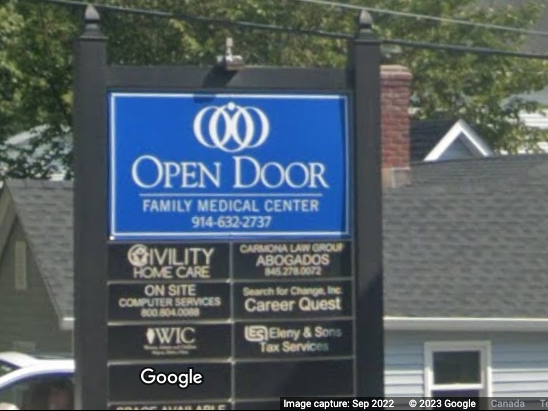HUDSON VALLEY, NY — As the U.S. healthcare system tightens services in the wake of the COVID pandemic, the Open Door Family Medical Centers is widening its patient care to offer “wrap around” coordination.
It’s a contrast. According to a new report by industry analyst McKinsey & Company called “The gathering storm: The uncertain future of US healthcare,” care could become even less affordable and accessible and more disjointed.
Handling U.S. healthcare can be a problem for any patient, but particularly those who are immigrants, have minimal or no medical insurance, speak little English, or have not seen a doctor in months or even years.
“For example, I can navigate the system for my annual exams,” Karen Mandel, Open Door’s Senior Director of Community Health, told Patch. “But some of our patients couldn’t even get those basics without a helping hand.”
That’s why the federally qualified health center with sites in Ossining, Brewster, Port Chester, Mamaroneck, Sleepy Hollow, Mount Kisco, and Saugerties now offers “wrap around” or care coordination services to its patients — a bundle of services with origins 20 years ago in support of patients living with HIV.
The “wrap-around” services might hook patients up with a registered dietitian so they eat better, introduce them to a Spanish-speaking specialist, refer them to services offered by resources in the community (e.g. food pantries, support groups, legal service), or help them fill out the paperwork necessary for them to receive additional medical services.
For patients who are generally healthy or managing non-critical, uncomplicated conditions, it might just mean making sure they understand what the doctor told them and educating them on next steps. For those with multiple chronic medical conditions like diabetes, asthma, cancer or heart disease, it could mean a personal care manager would accompany them to appointments with their medical specialists.
The pandemic greatly increased the need for these services at a time when many patients were out of work, lost their medical benefits, and/or found food pantries and other community services closed. Many fell behind in meeting their health care needs, Open Door officials said. As a result, patient advocacy services, which had been trending up pre-pandemic anyway, soared 27 percent from 2019 to 2021.
When Andrea Ruggiero, Executive Vice President of Community Health, first arrived at Open Door 19 years ago, HIV case managers were already in place.
“We saw that our patients were having a positive experience,” she said. “They were taking their medication, showing up for appointments, engaging actively in their care. So, we decided to replicate it.” This has grown over the years to include a team consisting of care managers, patient advocates and navigators, wellness coordinators and digital literacy specialists.
Many of Open Door’s patients struggle daily to work and care for their families. “I get to my doctor’s appointment, but then I’m supposed to do all these things. When? How?” Mandel said.
The patient advocates can do an assessment, design a care plan, and provide education. “It’s about ongoing communication, providing knowledge and making sure it gets retained,” Ruggiero said. “It means supporting them physically and mentally.”
It keeps people out of the emergency room at a time when emergency departments are in crisis nationwide.
It also differs from the broader healthcare community’s practice of separating a person’s health needs into many different categories in the interest of time and revenues, Mandel said. “We want to not break up a person into different pieces because each piece is part of a whole.”



